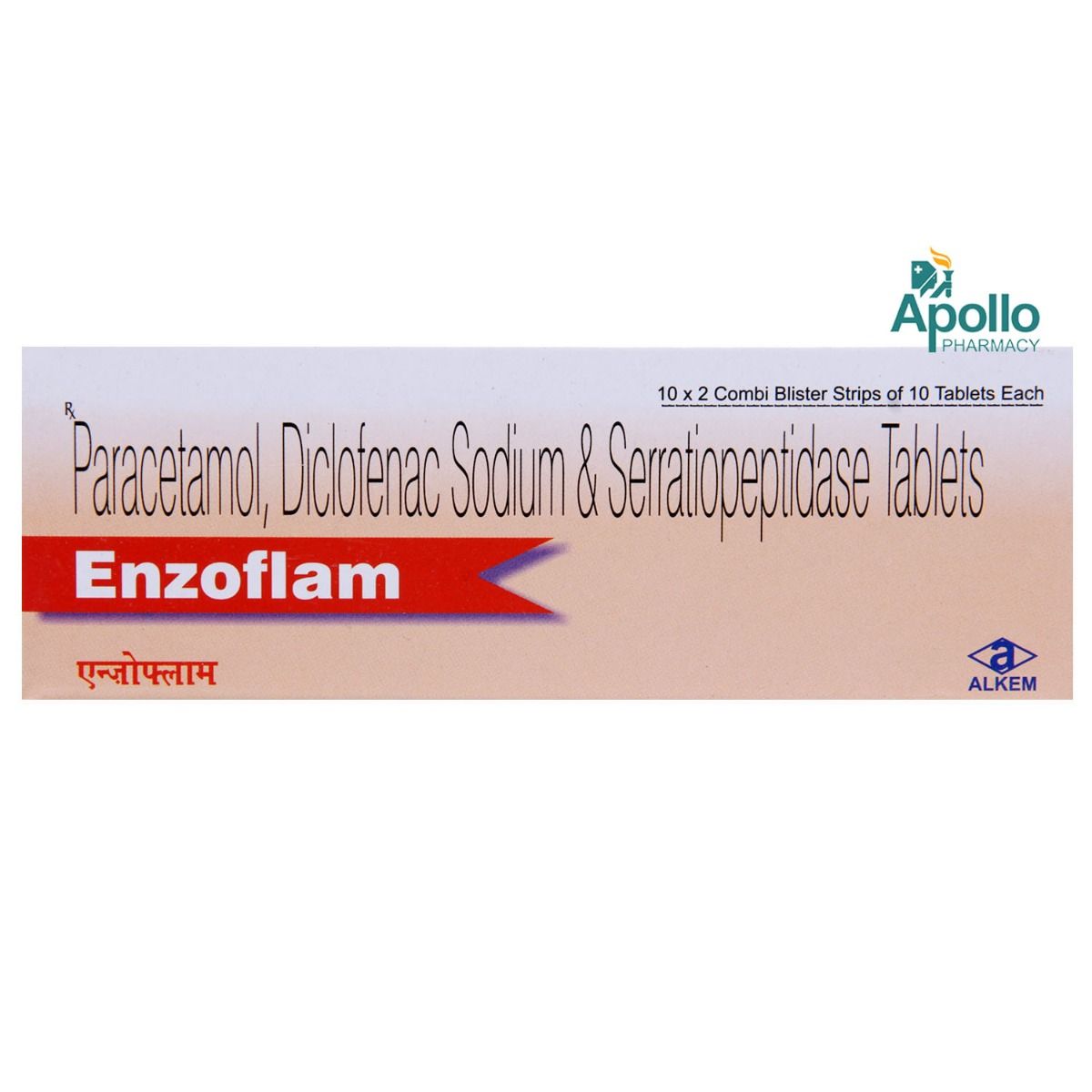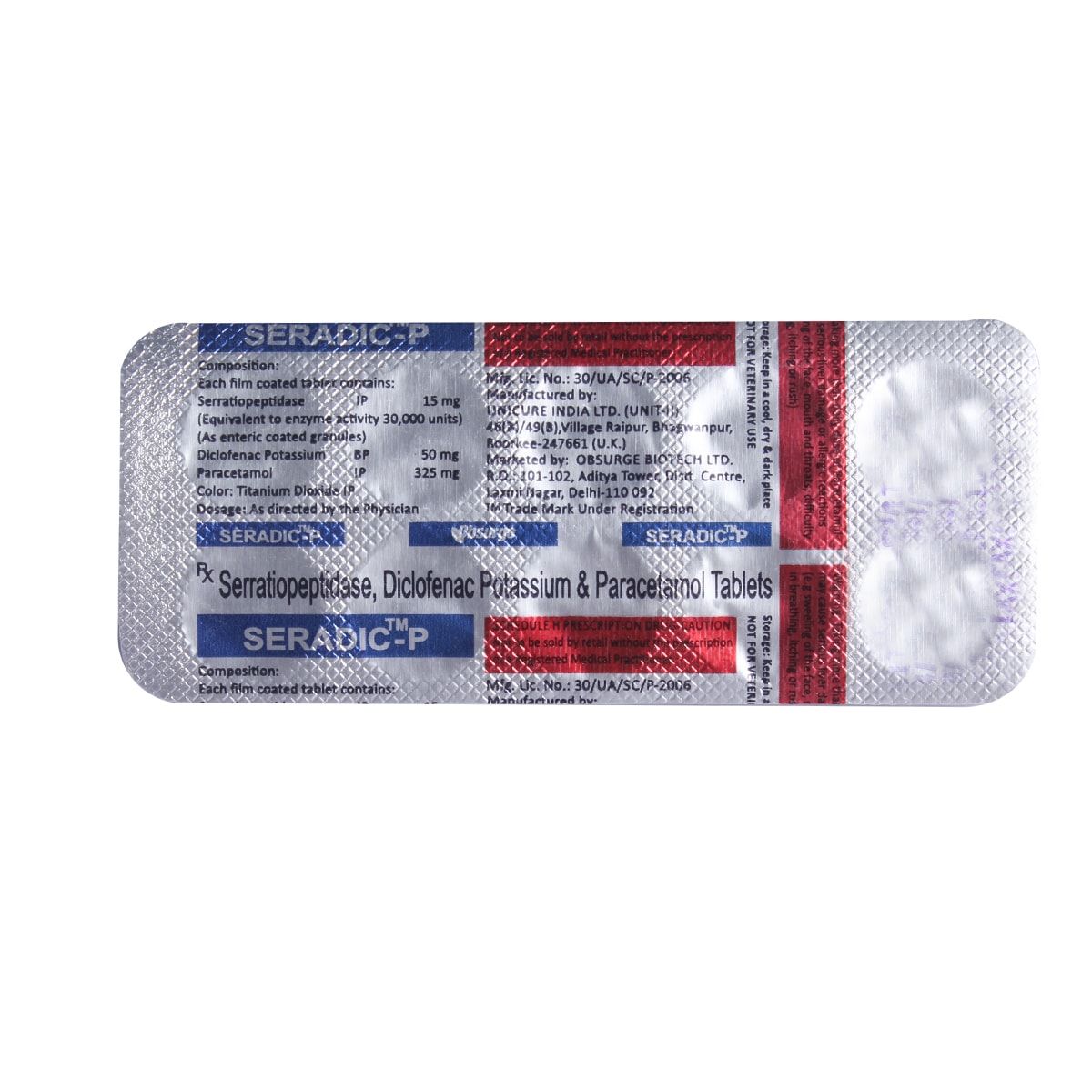Diclorise P Tablet 10's
₹98.1*
MRP ₹109
10% off
₹92.65*
MRP ₹109
15% CB
₹16.35 cashback(15%)
Free Delivery
With Circle membership
(Inclusive of all Taxes)
This offer price is valid on orders above ₹800. Apply coupon PHARMA10/PHARMA18 (excluding restricted items)
Know Your Delivery Time
Provide Delivery Location

Available Offers
 Prescription drug
Prescription drugWhats That

Secure Payment

India's Most Trusted Pharmacy

Genuine Products
Manufacturer/Marketer :
Consume Type :
Return Policy :
Expires on or after :
About Diclorise P Tablet
Diclorise P Tablet is used to relieve pain and inflammation in conditions like osteoarthritis, rheumatoid arthritis, and ankylosing spondylitis. Besides this, it also helps treat muscle pain, tooth pain during dental surgery, menstrual period pain/cramps, ear pain and migraine headaches. Pain is a symptom triggered by the nervous system, causing uncomfortable sensations in the body. Arthritis is the tenderness and swelling in the joints, which causes pain and joint stiffness.
Diclorise P Tablet is a combination of three drugs, namely: Diclofenac, Paracetamol and Serratiopeptidase. Diclofenac and Paracetamol work by blocking the effect of a chemical messenger known as cyclo-oxygenase (COX) enzymes that make other chemical prostaglandins. These prostaglandins are produced at injury sites and cause pain, swelling and fever. By blocking the COX enzyme's effect, fewer prostaglandins are produced, which reduces mild to moderate pain, inflammation and fever. Serratiopeptidase acts as a mucolytic (dissolves thick protein at the injured/affected site) and anti-inflammatory agent, thereby decreasing swelling at the painful site.
You are advised to take Diclorise P Tablet for as long as your doctor has prescribed it for you. In some cases, Diclorise P Tablet may cause certain common side effects such as nausea, vomiting, stomach pain, headache, indigestion and diarrhoea. Most of these side effects do not require medical attention and will resolve gradually over time. However, you are advised to talk to your doctor if you experience these side effects persistently.
Consult your doctor if you are pregnant or breastfeeding. Diclorise P Tablet may cause drowsiness and dizziness, so drive with caution. Diclorise P Tablet should not be given to children as safety and efficacy have not been established. Avoid consuming alcohol with Diclorise P Tablet as it could lead to increased drowsiness and dizziness; it might also increase the risk of stomach bleeding. Keep your doctor informed about your health condition and medicines to rule out any side effects/interactions.
Uses of Diclorise P Tablet
Directions for Use
Medicinal Benefits
Diclorise P Tablet is a combination of three drugs, namely: Diclofenac (pain killer), Paracetamol (fever reducer) and Serratiopeptidase (protein enzyme). Diclorise P Tablet is used to relieve pain and inflammation associated with osteoarthritis, rheumatoid arthritis, ankylosing spondylitis, muscle pain, tooth pain, bone and joint pain, headache, swelling, period pain, ear pain, migraine, fever, sore throat, nose pain, etc. Diclorise P Tablet increases the pain threshold and blood flow across the skin. Diclofenac and Paracetamol work by blocking the effect of chemical messengers that cause pain and inflammation. Serratiopeptidase breaks down the abnormal proteins at the site of inflammation, thereby reducing inflammation.
How Diclorise P Tablet Works
Storage
Side Effects of Diclorise P Tablet
- Nausea
- Vomiting
- Stomach pain
- Diarrhoea
- Indigestion
- Headache
What if I have taken an overdose of Diclorise P Tablet
Drug Warnings
Do not take Diclorise P Tablet if you are allergic to paracetamol, diclofenac or serratiopeptidase, have/had severe heart problems, stomach ulcer or perforation, bleeding problems such as bleeding from the stomach, intestine or brain, have undergone any heart bypass surgery, have had a heart attack, blood circulation problems or inflammation of intestines. Consult your doctor if you are pregnant, planning for pregnancy or breastfeeding. Diclorise P Tablet may cause drowsiness and dizziness, so drive only if you are alert. Diclorise P Tablet is not recommended for children less than 10 years of age as safety and effectiveness have not been established. Avoid consuming alcohol with Diclorise P Tablet as it could lead to increased drowsiness and increased risk of stomach bleeding. Stop taking Diclorise P Tablet and consult your doctor immediately if you have stomach pain or any signs of bleeding in the intestine or stomach, such as blood in stools. Do not take any other NSAIDs for pain relief along with Diclorise P Tablet unless prescribed.
Drug-Drug Interactions
Drug-Drug Interactions
Login/Sign Up
Co-administration of Diclorise P Tablet 10's and Ketoconazole may increase the risk of liver injury.
How to manage the interaction:
Although there is a possible interaction between Diclorise P Tablet 10's and Ketoconazole, you can take these medicines together if prescribed by a doctor. However, if you have joint pain or swelling, fever, chills, unusual bleeding or bruising, skin rash, itching, over-tiredness, nausea, vomiting, loss of appetite, stomach pain, dark-colored urine, light-colored stools, and/or yellowing of the skin or eyes, contact a doctor immediately as these may be signs and symptoms of liver damage. Do not discontinue the medication without consulting a doctor.
Co-administration of Diclorise P Tablet 10's may decrease the excretion rate of Oxazepam which could result in a higher serum level.
How to manage the interaction:
Although there is a possible interaction between Oxazepam and Diclorise P Tablet 10's, you can take these medicines together if prescribed by a doctor. Do not stop using any medications without a doctor's advice.
Co-administration of Diclorise P Tablet 10's and Valdecoxib may increase the risk or severity of adverse effects.
How to manage the interaction:
Although there is a possible interaction between Diclorise P Tablet 10's and Valdecoxib, you can take these medicines together if prescribed by a doctor. However, if the side effects worsen, please consult a doctor.
Co-administration of Mipomersen with Diclorise P Tablet 10's may increase the risk or severity of liver injury.
How to manage the interaction:
There may be a possibility of interaction between Diclorise P Tablet 10's and Mipomersen, but it can be taken if prescribed by a doctor. Do not stop using any medications without talking to a doctor.
Co-administration of Diclorise P Tablet 10's and Leflunomide may increase the risk of liver problems.
How to manage the interaction:
Although there is a possible interaction between Diclorise P Tablet 10's and Leflunomide, they can be taken together if prescribed by a doctor. However, if you experience fever, chills, joint pain or swelling, unusual bleeding or bruising, skin rash, itching, less desire to eat, fatigue, nausea, vomiting, abdominal pain, or yellowing of the skin or eyes, contact a doctor immediately. Do not discontinue any medications without consulting a doctor.
Co-administration of ketamine and Diclorise P Tablet 10's may decrease the effectiveness of Ketamine which could result in a higher blood level.
How to manage the interaction:
Although taking Ketamine and Diclorise P Tablet 10's together can evidently cause an interaction, it can be taken if a doctor has suggested it. If you're feeling very sleepy or having trouble breathing, it's important to contact your doctor right away. Do not stop using any medications without a doctor's advice.
Co-administration of Lomitapide and Diclorise P Tablet 10's may increase the risk of severity of liver injury.
How to manage the interaction:
Although there is a possible interaction between Diclorise P Tablet 10's and Lomitapide, you can take these medicines together if prescribed by a doctor. Do not stop using any medications without a doctor's advice.
Co-administration of Teriflunomide with Diclorise P Tablet 10's may increase the risk or severity of Liver problems.
How to manage the interaction:
Taking Diclorise P Tablet 10's with Teriflunomide together can possibly result in an interaction, but it can be taken if a doctor has advised it. Do not discontinue any medications without consulting a doctor.
Drug-Food Interactions
Drug-Food Interactions
Login/Sign Up
Diet & Lifestyle Advise
Exercising regularly helps in muscle stretching so that they are less likely to spasm, tear and sprain. Mild exercises such as jogging and walking are helpful for muscle stretching.
Massages can also be helpful.
Avoid freezing and hot temperatures.
Avoid wearing tight-fitting clothes; instead, wear loose garments.
Rest well, and get plenty of sleep.
To avoid developing pressure sores, change your position every two hours.
Hot or cold therapy can help treat muscle spasms. Apply an ice-pack or hot-pack on the muscle for 15-20 minutes.
Stay hydrated, drink plenty of water.
Habit Forming
Therapeutic Class
Diclorise P Tablet Substitute

Enzoflam Tablet 10's
₹15.03per tabletSeradic-P Tablet 10's
by AYUR
₹12.92per tabletFlozen Plus Tablet 10's
by AYUR
₹11.61per tabletDiclogesic-SP Tablet 10's
₹9.86per tabletCuroflam Tablet 10's
₹10.80per tablet
Product Substitutes
Alcohol
Unsafe
Avoid consumption of alcohol while taking Diclorise P Tablet as it may cause increased drowsiness.
Pregnancy
Caution
Please consult your doctor if you are pregnant; your doctor will prescribe Diclorise P Tablet only if the benefits outweigh the risks.
Breast Feeding
Caution
Consult your doctor if you are breastfeeding; your doctor will decide whether Diclorise P Tablet can be taken by breastfeeding mothers or not.
Driving
Caution
Diclorise P Tablet may cause dizziness and drowsiness. Do not drive or operate machinery unless you are alert.
Liver
Caution
Dose adjustment may be needed in patients with liver impairment. Please consult your doctor if you have a liver impairment or any concerns regarding this.
Kidney
Caution
Dose adjustment may be needed in patients with kidney impairment. Please consult your doctor if you have kidney impairment or any concerns regarding this.
Children
Unsafe
Diclorise P Tablet should not be given to children less than 10 years of age, as the safety and effectiveness have not been established.
FAQs
Country of origin
Manufacturer/Marketer address
Disclaimer
Author Details
We provide you with authentic, trustworthy and relevant information


















